Welcome to the 85th edition of Trade War.
Evergrande misses a debt payment and founder Xu Jiayin’s rags to riches background is explored. HNA executives taken into custody as Xi tightens screws on company executives.
Huawei executive returns home to a hero’s welcome and two Canadians released as China exercises “hostage diplomacy.” Foreign companies say China’s growing isolation bad for business but plan to continue to invest.
Evergrande’s ‘eerie silence’
Evergrande has missed a debt payment raising new fears about the fate of the beleaguered property developer, write The Guardian’s Vincent Ni and Julia Kollewe.
“The firm is now in uncharted waters and enters a 30-day grace period. It will default if that passes without payment,” reports The Guardian.
“These are periods of eerie silence as no one wants to take massive risks at this stage,” Howe Chung Wan, head of Asia fixed income at Principal Global Investors told the British paper. “There’s no precedent to this at the size of Evergrande … We have to see in the next 10 days or so, before China goes into holiday, how this is going to play out.”
China’s central bank has taken steps to bolster the financial system by injecting cash into the economy; “if Beijing were to become involved, it would most likely focus on making sure families get apartments they have already paid for, rather than trying to bail out banks or other creditors,” reports The Guardian.
“A lot of Chinese people have a lot to lose if their property prices plummet as a result of a disorderly collapse of Evergrande. It will hurt people’s confidence,” said Dexter Roberts of the Washington DC-based Atlantic Council’s Asia Security Initiative. “But on the opposite side, if the government is seen to have helped Evergrande too much, it will cause moral hazard.”

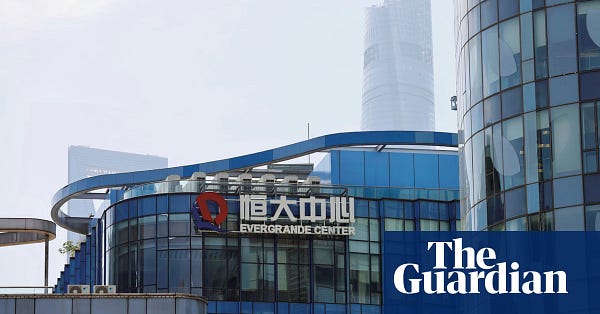
Making an example of China’s most indebted company..
While China’s firm control over its financial system means this is unlikely to be a “Lehman moment,” as some have suggested, there is a real possibility that China’s efforts to play hard ball with Evergrande could hit the larger economy hard, I say in an interview with CNN International’s Richard Quest.

Telegraphed and controlled detonation
Beijing continues to show no signs that it plans to bail out Evergrande while its chairman has taken steps to reassure company employees, reports Reuters.
"I would characterize Evergrande as a telegraphed and controlled detonation," T. Rowe Price Emerging Markets Bond fund’s Samy Muaddi told the wire service. "If an investor was still investing in Evergrande they were investing against Chinese policy makers, which is a good way to lose."
S&P Global Ratings says it expects no direct support forthcoming for Evergrande. "We believe Beijing would only be compelled to step in if there is a far-reaching contagion causing multiple major developers to fail and posing systemic risks to the economy," the rating agency wrote in a Monday report.
In a letter to staff, chairman Hui Ka Yuan (the Cantonese version of Xu Jiayin) wrote "I firmly believe that with your concerted effort and hard work, Evergrande will walk out of its darkest moment, resume full-scale constructions as soon as possible."

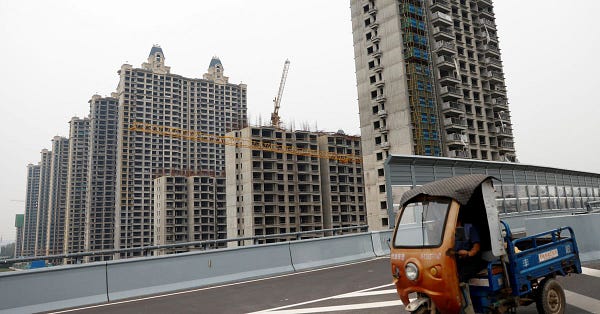
Xu and Xi
Evergrande chairman Xu Jiayin’s life history follows that of the economic rise of private business in China, with both now being tested by Xi’s crackdown on inequality and entrepreneurial excesses, writes SupChina’s Chang Che.
“Xu Jiayin’s story mirrors the ups and downs of a changing China, first under Deng and now under Xi. If Xu’s ascent from rural poverty to real estate mogul owes much to the Party, then his downfall has roots in the Party’s u-turn: a rebuke of capitalists, the moneyed class, and the Party officials that helped developers thrive,” writes Chang Che.
“The whole freewheeling [former president] Jiang Zemin way of the world is gone,” Richard McGregor, author of The Party: The Secret World of China’s Communist Rulers, told SupChina. “We’re in different parameters and values now.”
“In Xi’s mind, Xu may not be so different from the officials he axed in his first term: both represent the excesses of an economic system that had worked for political and economic elites under Jiang Zemin and Hu Jintao, but had corrupted them and the Communist Party,” writes Chang Che.

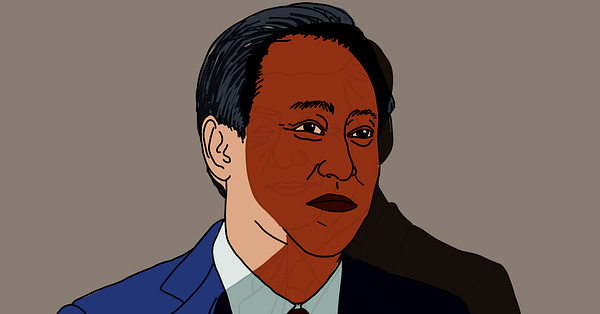
An extravagant lifestyle now frowned upon
Xu’s fall from grace may be fueled by the China’s top leader’s expressed distaste for the extravagant lifestyles of the ultra-wealthy, not just his company’s excessive borrowing, writes The Guardian’s Vincent Ni.
“Xu’s taste for luxury earned him the moniker “belt brother”, after he entered China’s annual legislative conference sporting a gold belt buckle in the shape of an “H’, logo of French couture house, Hermè,” reports Ni.
“Xu is a colorful figure. He lived an extravagant lifestyle that is now frowned upon by Xi as he kicks off his ‘common prosperity’ campaign,” says Dexter Roberts, senior fellow at the Washington DC-based Atlantic Council Asia Security Initiative. “For a long time, Evergrande’s business model, borrowing large sums of money and aggressively selling apartments that have not even been built, seemed like a smoking gun.”
“Xu is also one of those people Beijing now finds distasteful – flashy and over the top,” says Roberts. “I’d be really surprised if he emerges from this crisis unscathed.”

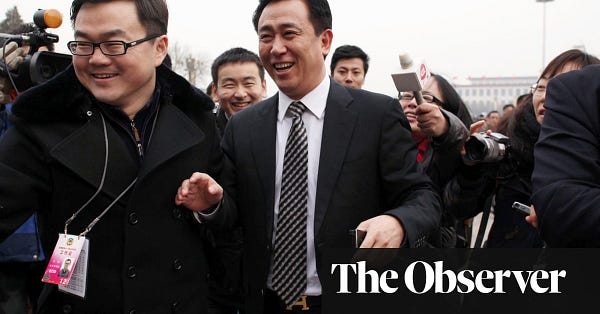
China detains once high-flying HNA execs
The authorities in China have detained the two top executives of the once high-flying HNA Group, writes the New York Times’ Keith Bradsher.
Chairman Chen Feng and chief executive Tan Xiangdong of the transportation and logistics company notorious for a global buying spree that led to its debt-fueled collapse in 2017, have been taken into custody in Hainan province, reports the paper.
The two were detained “in accordance with the law for suspected crimes,” the company said in a statement without providing details. Complicating the situation, Tan appears to be a U.S. citizen, according to a company filing.
“The Communist Party has responded to public concerns about rising income inequality by shifting its emphasis in economic policy. A goal of “common prosperity” has begun to supplant a previous tolerance for a private sector that grew rapidly but sometimes borrowed recklessly,” writes Bradsher.

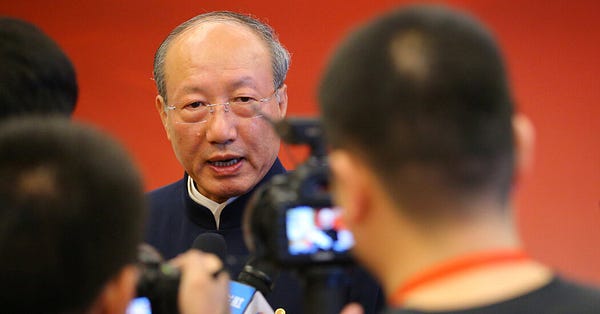
Xi’s ‘messianic streak’
Xi is trying to carry out a risky “amalgamation” of the public and private sectors of the economy and has a “messianic streak” that could prove destabilizing for the world, writes Washington Post columnist David Ignatius.
“The Chinese leader speaks internally of “amalgamation” of the public and private sectors, according to Christopher Johnson, a former top CIA China analyst who now heads the consulting firm China Strategies Group,” writes Ignatius.
“Johnson describes an explanation often heard in elite circles: “Xi wants the state sector to have more market discipline, and the private sector to have more party discipline.” The result is a severe squeeze on what Xi views as “undisciplined” entrepreneurs.”
Citing a recent blockbuster article on Xi’s crackdown on the private sector by the Wall Street Journal’s Lingling Wei, Ignatius refers to a “chilling detail” where Xi advisor and market-oriented advocate Liu He had to do a “self-criticism” for his role in allowing the controversial $4.4 billion IPO of ride-hailing company Didi.
“This humiliation of a senior official was an echo of Mao’s Cultural Revolution, which eviscerated China’s educated middle class in the 1970s,” Ignatius writes. Xi, “like Mao and other visionaries, [has] a messianic streak that could prove destabilizing for the world and downright toxic for China.”

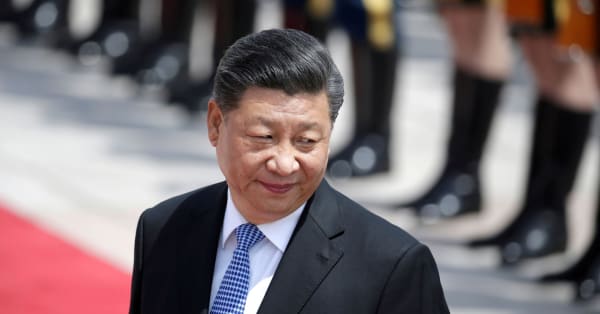
China not making a pretense: a straight hostage situation
Beijing’s decision to immediately release two long-detained Canadians after Huawei executive Meng Wanzhou was allowed to return to China, suggests the country’s leaders have adopted a new hardball tactic, write the New York Times’ Chris Buckley and Katie Benner.
“The executive, Meng Wanzhou, landed in China on Saturday night local time to a public that widely sees her as a victim of arrogant American overreach,” writes the Times. “By the same turn, Michael Spavor and Michael Kovrig, two Canadians detained by Chinese officials just days after Ms. Meng had been arrested, were released and arrived in Canada.”
“The swiftness of the apparent deal also stands as a warning to leaders in other countries that the Chinese government can be boldly transactional with foreign nationals, said Donald C. Clarke, a law professor specializing in China at George Washington University’s Law School,” write Buckley and Benner.
“They’re not even making a pretense of a pretense that this was anything but a straight hostage situation,” Clarke told the Times, referring to the two Canadians who were held on spying charges. “In a sense, China has strengthened its bargaining position in future negotiations like this.”


Flag-waving Huawei welcome
“It’s a Huawei welcome,” tweets China communications strategist Marc Ross, with an accompanying picture of the flag-waving welcoming party waiting for Meng Wanzhou in Shenzhen.
Welcome Home!
And China’s foreign ministry spokesperson tweets “Welcome Home!” and “Justice prevails” upon the Huawei executives return.
“Now, control is more important than growth”
Newly released surveys show foreign companies are hurting as China keeps its borders largely closed to travel and continues to clamp down on business while favoring domestic firms, reports the Wall Street Journal’s Liza Lin.
The American Chamber of Commerce in Shanghai’s annual survey shows 45 percent of companies’ have experienced negative business impacts because of China’s strict border crossing limits, with over a quarter seeing their profits suffer.
The measures have “made it difficult for multinationals to send in employees from overseas into China, including senior executives to assess the market or critical engineering talent,” according to chamber chair Jeffrey Lehman. Meanwhile, one half of surveyed companies “felt strong or some favoritism toward local companies,” up from 47 percent a year ago.
The European Union Chamber of Commerce in China reported in a separate survey that China is favoring its state-owned enterprises over foreign companies, while its focus on national security and self-sufficiency could eventually drive away investors and hurt its economy.
European companies too are dealing with growingly nationalistic Chinese consumers and fear possible boycott as experienced by Swedish retailer H&M earlier this year. For now, most foreign companies say however, they have no intention of leaving.
“China is all about balancing growth and control. Now, control is more important than growth,” Jörg Wuttke, the European Chamber president, said in a news conference announcing his organization’s survey.

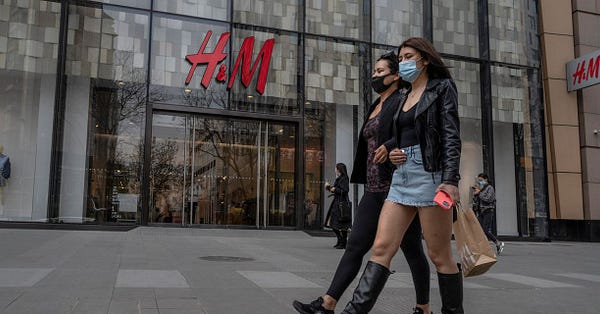
Notable/In Depth
What a week in China news. I spoke to Bloomberg Businessweek Radio’s Carol Massar and Tim Stenovec about Evergrande, the latest crackdown on crypto, and what comes next in Xi’s assault on business, in this podcast (starts at 8:55).

Here’s an interesting chart that shows that China will become the world’s largest economy in the early 2030s and remain so for many years. (I am among those who are skeptical China will smoothly transition to global power - I lay out why in my 2020 book The Myth of Chinese Capitalism.)


Despite Beijing’s calls for companies to start treating their gig workers more fairly, “neither local governments nor trade unions have shown any resolve to stop tech giants from dodging employer responsibilities,” writes the China Labour Bulletin.

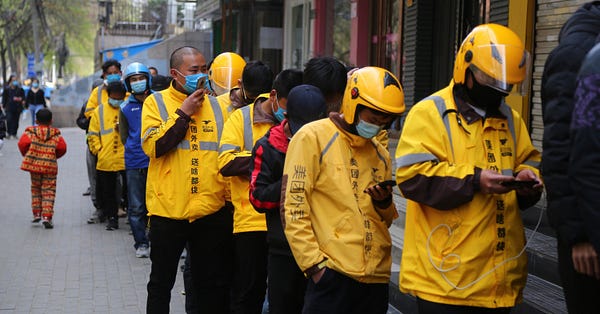
“Most of China’s labor protests are directed not against, but at the central government. Protests are initiated, for example, by home buyers who are betrayed by real estate companies, by migrant workers who have had their wages withheld, or by investors who have lost their savings,” writes (in German) University of Vienna professor Christian Goebel.
“Instead of bringing expensive and hopeless legal proceedings against politically well-connected entrepreneurs, real estate companies or shadow banks, they try to use protests to force the government to act.”



Once China’s national champion, Huawei is now fighting to survive, writes Bloomberg Opinion columnist Hal Brands.

The failure of Blackstone to acquire property developer Soho China shows that “everything is political” in China today, reports the Financial Times.


“Many of China’s largest non-state business systems are more akin to mafia systems, or organized crime, than they are to other conceptualizations of firms (i.e. entrepreneurs, small and medium enterprises, state-owned enterprises, national champions, and so forth) or even business groups,” write Harvard University Business School’s Meg Rithmire and University of Southern California’s Hao Chen in a paper from earlier this year.
“Mafia-like business systems can be identified by two features of their organization (plunder and obfuscation) and two means of growth and survival (relations of “mutual endangerment” within firms and between firms and political elites and manipulation of financial systems).”
Montana moment
Some pictures of morning fog from a recent walk.








